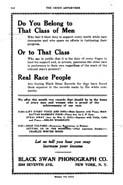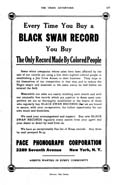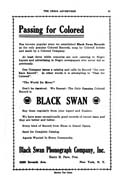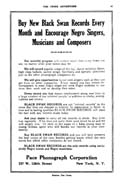Teaching the Article
Exercise 4
Public Opinion and Advertising
One of Black Swan's goals was to use music and business ownership to alter the ideas that people, both white and black, had about African Americans. In pursuing these ends, Black Swan drew on an emerging body of thought about shaping and directing mass public opinion. This thought had roots in psychology, advertising, and wartime propaganda, which themselves overlapped.
This exercise is about public opinion, advertising, and how to bring about changes in the political will. Formal, systematic thinking about public opinion grew out of World War I, the first war that involved deliberate use of mass, government-sponsored propaganda. Such thinking was closely linked to the emergent advertising industry, which also claimed to sway the opinions of ordinary men and women. Consider the following excerpts, each written by a leading figure in the field of public opinion:
-
George Creel, How We Advertised America (1920). George Creel headed the United States's wartime propaganda bureau, the Committee for Public Information (CPI).
-
Walter Lippmann, Public Opinion (1922). Lippmann was perhaps the leading columnist and political commentator of his era. Public Opinion is still widely read among political scientists.
Edward L. Bernays, Crystallizing Public Opinion (1923). A nephew of Sigmund Freud, Bernays is widely regarded as the father of public relations. This book is an advice manual for public relations counsels (consultants), who were then appearing for the first time.
How do these ideas about public opinion compare with Harry Pace's comments in a 1921 speech on "Public Opinion and the Negro" given to the National Association for the Advancement of Colored People (NAACP)?
Now consider these advertisements from the Crisis, the NAACP's monthly edited by W. E. B. Du Bois:

"Do You Belong to That Class of Men" (1923). |

"Every Time You Buy a Black Swan Record" (1922). |

"Passing for Colored" (1922). |

"Buy New Black Swan Records Every Month" (1921). |
How did Pace try to use advertisements to shape public opinion about Black Swan and its goals? How did he position Black Swan to shape public opinion about African Americans' cultural, political, and economic ambitions?
Some other questions to consider: Is it surprising to find ads for a record company in a manifestly political periodical? Is it significant that they appeared there? Who read the Crisis? Is Black Swan's Crisis advertising provocative, persuasive, effective advertising? Do Black Swan's tactics foreshadow the relationship between advertising and politics today? How? How is public opinion management different from advertising? Or is it?
